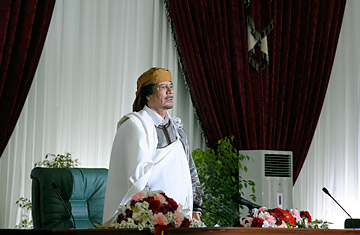
Gaddafi speaks at a ceremony to mark 34 years of Libyan "people power" in Tripoli on March 2, 2011
Tripoli is a city of contradictions.
Traveling from the airport to a hotel, I am told by a government minder that there are no problems and that the country and city are safe. But after checking in, the concierge, Mohamed, warns about walking to the Old City, less than 200 yards from the front door. Normally this area would flooded with tourists, but now, he says, "It's dangerous for you as foreigners." Libya is in the midst of a popular revolt, yet for now, Tripoli seems to be an oasis, with limited signs of discontent as turmoil swirls around the capital.
Traveling to Green Square in the heart of the city, a festival marking Jamahiriya Day — the anniversary of Colonel Muammar Gaddafi's declaration that Libya is a "state of the masses" — is under way. Men on horseback in flowing white robes wave green flags while trotting around the square. Hundreds of Gaddafi supports chant slogans in defense of their 68-year-old leader. "We sacrifice our souls and blood for you, Gaddafi," says the crowd in unison. "The people definitely want Gaddafi."
Banners on the ruins of Tripoli's historic Red Castle read "JSC-BBC do not spread news that reflect others' wishful thinking" (referring to Al Jazeera Satellite Channel and the British Broadcasting Corp.) and "Family members talk but never fight each other." Bashir, who is wearing a Libyan flag and Gaddafi hat, says, "Al-Jazeera is spreading lies about Libya. They report the lies people tell them without looking for themselves."
Gaddafi supporters here blame foreign media for exacerbating the current unrest. In addition, they accuse foreign fighters, namely al-Qaeda, for stirring turmoil in the country. "These men who are fighting aren't Libyan," says Saleh, a businessman. "They are foreigners trying to create problems in our country." Khalifa, who owns a hookah café, says, "All the Libyan people love and support Gaddafi."
But while people are eager to voice support for their leader, many are less eager to give their full names. These supporters seem to be unaware, willingly or unwillingly, that large swaths of their country are falling to anti-Gaddafi forces.
One man who is well aware of the current situation is Gaddafi. While protesters in Green Square deny any real uprising, the Libyan leader has vowed to crush it, stating, "We will fight until the last man and last woman to defend Libya from east to west, north to south." His statements have seemed to contradict those of his supporters.
Our cab driver, Mohamed, who accompanied us for the afternoon, is skeptical of the supporters in the square. "Ninety percent of the people you just talked to were police," he says. There was no way to verify his claim. "People are scared here in Tripoli to say what they want," he says. "Anyone could be an undercover police officer."
While there appears to be overt support for Gaddafi in the capital, it is hard to tell how widespread it is. On the way back to the hotel, a demonstration by Gaddafi supporters halts traffic. Flags of two local soccer clubs, Ahly and Etihad, flutter in the wind amid pictures of Gaddafi. Fierce rivals on the field, these two teams are united on the street under banners reading "God, Muammar, Libya, only." As the last supporters pass by our car, Mohamed looks in the rearview mirror and says, "That wasn't many [supporters]."
